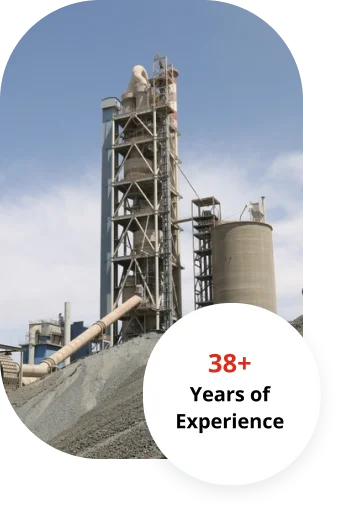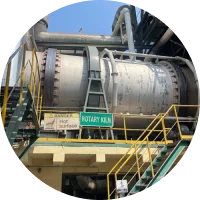
Lighthouse ERP
Cement Industry
Simple to Use
Easy to Implement
Flexible to Customized Solution

The cement industry, powering the growth of construction, real estate, and industrial projects across the nation. With urbanization, smart cities, and rapid infrastructure expansion driving demand, cement remains one of the most indispensable materials in the world. Given its critical role in national development, the industry operates under constant pressure to maintain uninterrupted production and supply cycles. However, managing cement manufacturing involves a complex web of operations which makes it essential to have an integrated system that can handle the scale and intricacy of daily activities.
Lighthouse Manufacturing ERP software offers a robust solution to manufacturers to meet these challenges. In an industry that involves high-temperature processing limestone, clay, and sand, and requires extensive coordination between departments, this ensures smooth functioning across areas such as Security Gate, quality control, Yard and freight management, and even quality-linked purchasing bill passing.
Core ERP Modules of Lighthouse ERP helps cement manufacturers achieve operational accuracy and speed while maintaining compliance and audit readiness. It delivers actionable insights with division-wise reports on inventory, operations, sales, and profitability enabling smart decision-making through advanced MIS and statutory reporting.
With 38 years of domain experience, Lighthouse Info Systems has evolved with industry trends to deliver a comprehensive business-performance platform powered by BI, IoT, AI, and process automation. Cement manufacturing ERP solution trusted by India’s top cement manufacturers for its reliability, depth, and industry focused features.


The concern of ERP for manufacturing industry is inconsistent input material quality and lack of real-time adjustments in limestone laterite fly ash ratios lead to unstable clinker formation and product reprocessing.

Absence across waste heat recovery systems, kilns, and mills results in heat losses, higher fuel consumption and unplanned downtimes.

Lack of digital traceability from kiln to clinker yard to grinding units disrupts grade-specific blending accuracy, while manual silo stock estimation leads to errors without production planning module.

Disconnected systems across bagging units, weighbridges, and security gates result in overloading errors, duplication in vehicle entries, delayed invoicing, and dispatch problems.

Cement loss enough pilferage or in-transit damage remains undetected due to the absence of GPS-integrated fleet tracking and real-time depot reconciliation systems.

Manual compilation of OPC, PPC, and slag cement sales data restricts real-time profitability analysis and delays fleet tracking and real-time depot reconciliation systems.

Manual administration of dealer-specific credit terms, incentives, and discount structures leads to invoice mismatches, revenue leakage, and delayed receivables.

High Dependency on manual input across plant, and warehouse transactions increases risk of non-compliance with GST mandates, resulting in audit flags and penalties when GST enabled ERP is not used.

ERP software for cement integrates with DCS and WHRS systems to monitor kiln temperature, control heat loss, and link clinker batches to cement grades.
ERP software for manufacturing industry connects raw material inputs with LIMS data to auto-correct mix ratios, ensuring consistent cement composition and strength with quality management capabilities.
ERP for cement manufacturing monitors mills motor load, Blaine fineness, and feed rate in real time to optimize grinding performance and reduce energy waste.
ERP syncs weighbridge, gate pass, and dispatch schedules to eliminate duplicate entries, overloading, and truck delays. Enhancing inventory management & dispatch efficiency.
ERP enables GPS-based truck tracking and barcode scanning to reduce pilferage and ensure delivery verification through depot-wise traceability features.
Applies dealer-specific credit rules, discount structures, and auto-blocking mechanisms to prevent invoice mismatches and revenue loss through finance integration.
Tracks fuel types and calorific values used in kilns, enabling cost-effective blending of coal, pet coke, and AFR.
Generates e-invoices/e-way bills across locations while displaying livestock levels in silos by cement grade for accurate dispatch planning via sales and distribution.
Manage Item BOM, MRP, batch-wise production, and shift-wise control with real-time variance and yield analysis.
Enable PLC & DCS integration for process automation, test traceability, and accurate MIS on plant performance.
Track inward/outward movements at Security Gate, Weighbridge, Lab, and Yards with traceability from raw material to finished goods.
Handle division-wise & consolidated ledgers, costing, profitability, and inter-division sales/purchase entries.
Track material, overhead, and process-wise costs with product-wise costing, recovery, and efficiency control.
Monitor plant movements including inter-yard transfers, rake inward, returns, and scrap movement with WIP pricing.
Manage sales cycle from enquiry to dispatch with integrated weighslips, delivery orders, and real-time e-invoicing.
Implement pricing structures like quantity discounts, credit terms, and period-based contracts for customer flexibility.
Get 10-level drilldown MIS for detailed analysis from Group → Issue Slip, across all locations and materials.
Track outsourced jobwork, service bills, freight scenarios, and approval workflows for controlled expenditure.